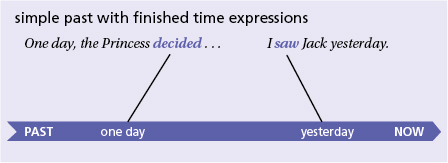Simple past
This form is also called ‘past simple’.
Forms (regular verbs)
| Affirmative | Question | Negative |
|---|---|---|
| I worked | did I work? | I did not work |
| you worked | did you work? | you did not work |
| he/she/it worked | did he/she/it work? | he/she/it did not work |
| etc | etc | etc |
- Contracted negatives (see here): I didn’t work, you didn’t work, etc
- Negative questions (see here): did I not work? or didn’t I work?, etc
- For the affirmative past forms of common irregular verbs, (see here).
- Questions and negatives of irregular verbs are made in the same way as those of regular verbs (with did + infinitive).
For details of question structures, (see here).
For negatives, (see here).
For passive forms (e.g. Work was done), (see here).
Pronunciation of -ed
The regular past ending -ed is pronounced as follows:
- /d/ after vowels and voiced consonants (except /d/):
/ð/, /b/, /v/, /z/, /ʒ/, /dʒ/, /g/, /m/, /n/, /ŋ/, /l/
tried /traɪd/ - lived /lɪvd/ - seemed /siːmd/ - failed /feɪld/ - /t/ after unvoiced consonants (except /t/):
/θ/, /p/, /f/, /s/, /ʃ/, /tʃ/, /k/
stopped /stɒpt/ - passed /pɑːst/ - laughed /lɑːft/ - watched /wɒtʃt/ - worked /wɜːkt/ - /ɪd/ after /d/ and /t/
ended /ˈendɪd/ - started /ˈstɑːtɪd/
For adjectives like aged, naked, (see here).
Spelling of regular affirmative past tense forms
| Rules | Examples |
|---|---|
| Most regular verbs: add -ed | work → worked stay → stayed show → showed wonder → wondered visit → visited gallop → galloped |
| Verbs ending in -e: add -d | hope → hoped decide → decided |
| Verbs ending in one stressed vowel + one consonant (except w or y): double the consonant and add -ed | shop → shopped plan → planned reˈfer → referred reˈgret → regretted |
| For last syllable not stressed: add -ed | ˈoffer → offered ˈvisit → visited |
| Verbs ending in consonant + -y: change y to i and add -ed | hurry → hurried cry → cried study → studied |
| For vowel + -y: add -ed | play → played |
Verbs ending in -c have ck in the past (e.g. picnic → picnicked).
In British English, -l is doubled in the past after one short vowel even if the vowel is not stressed: ˈtravel → travelled.
Use
We use the simple past for many kinds of past events: short, quickly finished actions and happenings, longer situations, and repeated events.
- Daniel broke a window last night.
- I spent all my childhood in Scotland.
- Regularly every summer, Jessica fell in love.
The simple past is common in stories and descriptions of past events.
- One day the Princess decided that she didn’t like staying at home all day, so she told her father that she wanted to get a job …
The simple past is often used with words referring to finished times.
- I saw Jack yesterday morning. He told me …
In general, the simple past tense is the normal one for talking about the past; we use it if we do not have a special reason for using one of the other tenses.

For the simple past with a present or future meaning (e.g. It’s time you went), (see here).
For special uses in subordinate clauses, (see here).